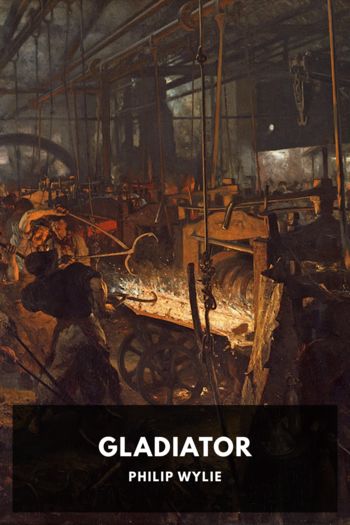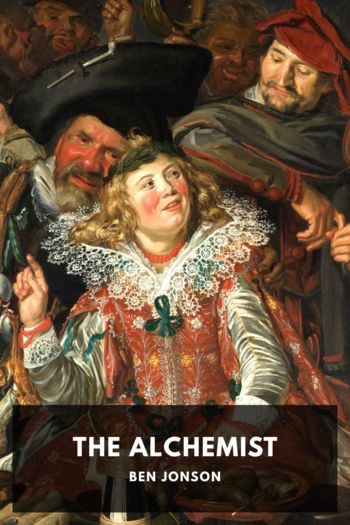Gladiator - Philip Wylie (classic novels for teens txt) 📗

- Author: Philip Wylie
- Performer: -
Book online «Gladiator - Philip Wylie (classic novels for teens txt) 📗». Author Philip Wylie
Hugo’s problems had been abandoned. He worked as hard as he dared. The presence of grandeur and din made him content. How long it would have lasted is uncertain; not forever. On the day when he had pushed up two hundred and three loads during his shift, the boss stopped him in the yard. A tall, lean, acid man. He caught Hugo’s sleeve and turned him round. “You’re one of the bastards on the furnace line.”
“Yes.”
“How many cars did you push up to-day?”
“Two hundred and three.”
“What the hell do you think this is, anyway?”
“I don’t get you.”
“Oh, you don’t, huh? Well, listen here, you God-damned athlete, what are you trying to do? You got the men all sore—wearing themselves out. I had to lay off three—why? Because they couldn’t keep up with you, that’s why. Because they got their guts in a snarl trying to bust your record. What do you think you’re in? A race? Somebody’s got to show you your place around here and I think I’ll just kick a lung out right now.”
The boss had worked himself into a fury. He became conscious of an audience of workers. Hugo smiled. “I wouldn’t advise you to try that—even if you are a big guy.”
“What was that?” The words were roared. He gathered himself, but when Hugo did not flinch, did not prepare himself, he was suddenly startled. He remembered, perhaps, the two hundred and three cars. He opened his fist. “All right. I ain’t even goin’ to bother myself tryin’ to break you in to this game. Get out.”
“What?”
“Get out. Beat it. I’m firing you.”
“Firing me? For working too hard?” Hugo laughed. He bent double with laughter. His laughter sounded above the thunder of the mill. “Oh, God, that’s funny. Fire me!” He moved toward the boss menacingly. “I’ve a notion to twist your liver around your neck myself.”
The workers realized that an event of some magnitude was taking place. They drew nearer. Hugo’s laughter came again and changed into a smile—an emotion that cooled visibly. Then swiftly he peeled up the sleeve of his shirt. His fist clenched; his arm bent; under the nose of his boss he caused his mighty biceps to swell. His whole body trembled. With his other hand he took the tall man’s fingers and laid them on that muscle.
“Squeeze,” he shouted.
The boss squeezed. His face grew pallid and he let go suddenly. He tried to speak through his dry mouth, but Hugo had turned his back. At the brick gate post he paused and drew a breath.
His words resounded like the crack of doom. “So long!”
IN THE next four weeks, Hugo knew the pangs of hunger frequently. He found odd jobs, but none of them lasted. Once he helped remove a late snowstorm from the streets. He worked for five days on a subway excavation. His clothes became shabby, he began to carry his razor in his overcoat pocket and to sleep in hotels that demanded only twenty-five cents for a night’s lodging. When he considered the tens of thousands of men in his predicament, he was not surprised at or ashamed of himself. When, however, he dwelt on his own peculiar capacities, he was both astonished and ashamed to meander along the dreary pavements.
Hunger did curious things to him. He had moments of fury, of imagined violence, and other moments of fantasy when he dreamed of a rich and noble life. Sometimes he meditated the wisdom of devouring one prodigious meal and fleeing through the dead of night to the warm south. Occasionally he considered going back to his family in Colorado. His most bitter hours were spent in thinking of Mr. Shayne and of accepting a position in one of Mr. Shayne’s banks.
At the end of four weeks, with hunger gnawing so avidly at his core that he could not pass a restaurant without twitching muscles and quivering nerves, he turned abruptly from the street into a cigar store and telephoned to Mr. Shayne. The banker was full of sound counsel and ready charity. Hugo regretted the call as soon as he heard Mr. Shayne’s voice; he regretted it when he was ravishing a luxurious dinner at Mr. Shayne’s expense. It was the weakest thing he had ever done in his life.
Nevertheless he accepted the position offered by Mr. Shayne. That same evening he rented a small apartment, and lying on his bed, a clean bed, he wondered if he really cared about anything or about any one. In the morning he took a shower and stood for a long time in front of the mirror on the bathroom door, staring at his nude body as if it were a rune he might learn to read, an engima he might solve by concentration. Then he went to work. His affiliation with the Down Town Savings Bank lasted into the spring and was terminated by one of the oddest incidents of his career.
Until the day of that incident his incumbency was in no way unusual. He was one of the bank’s young men, receiving fifty dollars weekly to learn the banking business. They moved him from department to department, giving him mentally menial tasks which afforded him in each case a glimpse of a new facet of financial technique. It was fairly interesting. He made no friends and he worked diligently.
One day in April when he had returned from lunch and a stroll in the environs of the Battery—returned to a list of securities and a strip from an adding machine, which he checked item by item—he was conscious of a stirring in his vicinity. A woman employee on the opposite side of a wire wicket was talking shrilly. A vice-president rose from his desk and hastened down the corridor, his usually composed face suddenly white and disconcerted. The tension was cumulative. Work stopped and clusters of people began to chatter. Hugo joined one of them.
“Yeah,” a boy was saying, “it’s happened before. A couple o’ times.”
“How do they know he’s there?”
“They got a telephone goin’ inside and they’re talkin’ to him.”
“I’ll be damned.”
The boy nodded rapidly. “Yeah—some talk! Tellin’ him what to try next.”
“Poor devil!”
“What’s the matter?” Hugo asked.
The boy was glad of a new and uninformed listener. “Aw, some dumb vault clerk got himself locked in, an’ the locks jammed an’ they can’t get him out.”
“Which vault? The big one?”
“Naw. The big one’s got pipes for that kinda trouble. The little one they moved from the old building.”
“It’s not so darn little at that,” some one said.
Another person, a man, chuckled. “Not so darn. But there isn’t air in there to last three hours. Caughlin said so.”
“Honest to God?”
“Honest. An’ he’s been there more than an hour already.”
“Jeest!” There was a pregnant, pictorial silence. Some one looked at Hugo.
“What’s eatin’ you, Danner? Scared?”
His face was tense and his hands were opening and closing convulsively. “No,” he answered. “Guess I’ll go down and have a look.”
He rang for an elevator in the corridor and was carried to the basement. In the small room on which the vault opened were five or six people, among them a woman who seemed to command the situation. The men were all smoking; their attitudes were relaxed, their voices hushed.
One repeated nervously: “Jesus Christ, Jesus Christ, Jesus Christ.”
“That won’t help, Mr. Quail. I’ve sent for the expert and he will probably have the safe open in a short time.”
“Blowtorches?” the swearing man asked abruptly. “Absurd. He would cook before he was out. And three feet of steel and then two feet more.”
“Nitroglycerin?”
“And make jelly out of him?” The woman tapped her finger-nails with her glasses.
Another arrival, who carried a small satchel, talked with her in an undertone and then took off his coat. He went first to a telephone on the wall and said: “Gi’ me the inside of the vault. Hello… . Hello? You there? Are you all right? … Try that combination again.” The safe-expert held the wire and waited. Not even the faintest sounds of the attempt were audible in the front room. “Hello? You tried it? … Well, see if those numbers are in this order.” He repeated a series of complicated directions. Finally he hung up. “Says it’s getting pretty stuffy in there. Says he’s lying down on the floor.”
People came and went. The president himself walked in calmly and occupied a chair. He lit a cigar, puffed on it, and stared with ruminative eyes at the shiny mechanism on the front of the safe.
“We are doing everything possible,” the woman said to him crisply.
“Of course,” he nodded. “I called up the insurance company. We’re amply covered.” A pause. “Mrs. Robinson, post one of the guards to keep people from running in and out of here. There are enough around already.”
No one had given Hugo any attention. He stood quietly in the background. The expert worked and all eyes were on him. Occasionally he muttered to himself. The hands of an electric clock moved along in audible jerks. Nearly an hour passed and the room had become hazy with tobacco smoke. The man working on the safe was moist with perspiration. His blue shirt was a darker blue around the armpits. He lit a cigarette, set it down, whirled the dials again, lit another cigarette while the first one burned a chair arm, and threw a crumpled, empty package on the floor.
At last he went to the phone again. He waited for some time before it was answered, and he was compelled to make the man inside repeat frequently. The new series of stratagems was without result. Before he went again to his labors, he addressed the group. “Air getting pretty bad, I guess.”
“Is it dark?” one of them asked tremulously. “No.”
Fifteen minutes more. The expert glanced at the bank’s president, hesitated, struggled frenziedly for a while, and then sighed. “I’m afraid I can’t get him out, sir. The combination is jammed and the time-clock is all off.”
The president considered. “Do you know of any one else who could do this?”
The man shook his head. “No. I’m supposed to be the best. I’ve been called out for this—maybe six times. I never missed before. You see, we make this safe—or we used to make it. And I’m a specialist. It looks serious.”
The president took his cigar from his mouth. “Well, go ahead anyway—until it’s too late.”
Hugo stepped away from the wall. “I think I can get him out.”
They turned toward him. The president looked at him coldly. “And who are you?”
Mrs. Robinson answered. “He’s the new man Mr. Shayne recommended so highly.”
“Ah. And how do you propose to get him out, young man?” Hugo stood pensively for a moment. “By methods known only to me. I am certain I can do it—but I will undertake it only if you will all leave the room.”
“Ridiculous!” Mrs. Robinson said.
The president’s mouth worked. He looked more sharply at Hugo. Then he rose. “Come on, everybody.” He spoke quietly to Hugo. “You have a nerve. How much time do you want?”
“Five minutes.”
“Only five minutes,” the president murmured as he walked





Comments (0)